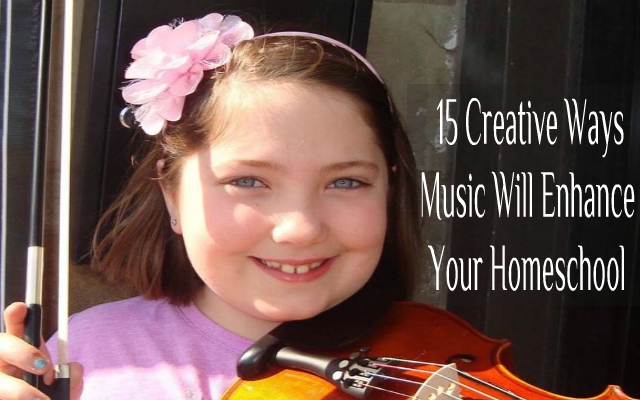15 Creative Ways Music Will Enhance Your Homeschool


I grew up in a musical home. My father was in a top 40s band, The Knight Kats (isn’t that so clever?!), and my mother sang in the band and in choir at church. Music was just what happened in our home; it wasn’t forced upon my sister and I. It became my favorite hobby. However, when I started teaching private piano and voice lessons 24 years ago, I never thought it was going to continue to be an important part of my life.
When I share that music is a main curriculum in our homeschool, I get a variety of responses. Some raise their eyebrows, and others shake their heads. Incorporating music into home life isn’t as difficult as some believe. Even though I wasn’t trained as a Suzuki instructor, I love his view of music:
“The real essence of art turned out to be not something high up and far off – it was right inside my ordinary daily self-”
This means, all children (even those with special needs), can benefit and flourish through music in the home. The larger question is: how do you go about adding this subject to your daily life? I promise you, it is so much easier than it sounds. Here are 15 creative ways music will enhance your homeschool:
1. Play classical music in the background while doing other curriculum. Studies have shown playing music while studying fosters retention of information.
2. Encourage a silly dance time between curriculum.
3. Begin the day with a song. In a typical Waldorf school, the day begins in circle time.
4. End the day with a song. It is healthy for the brain to decompress before bedtime. Relaxing music can provide elements to help the process.
5. Sing while traveling between errands or when going to co-ops. Silly “made-up” songs or songs from camp are super fun.
6. Use songs to learn information (i.e. Fifty Nifty United States to learn the states in alphabetical order, or one of the many Books of the Bible songs).
7. Use music to help children relax or during quiet time. Even once the afternoon nap is no longer needed, quiet time can be a wonderful time to recharge batteries.
8. Encourage students to take a private music lesson. I suggest violin or piano as a beginning instrument.
9. Attend local orchestra concerts and live music shows. Many local orchestras have age appropriate concerts for little ones as well.
10. Make routine chores fun with adding music.
11. Play music together – even if it is with simple rhythm instruments.
12. Listen to music to inspire writing or artwork.
13. Listen to classical music at lunchtime and discuss what instruments are playing.
14. Incorporate music with history lessons. If you are looking for a solid curriculum to add to your schedule, I have written one that can be incorporated with very little preparation: If It Isn’t Baroque
15. Play Name That Tune, or another music centered board game. A few I like are Spontuneous, Measure Up and Dominotes.
Once you incorporate music into your daily life, it will seem as if it has always been there. Students usually really love to share what they enjoy, and that includes music. Even if you are reluctant to add music to your school day, simply choose something from the above list and I promise it will be much easier than you think.
Michelle Martin was born into a musical family and has been teaching music for over 20 years. Besides teaching piano and voice, Michelle is a performer, a choir director, a writer, a composer, and a homeschool mom. Most recently she has published three music curricula through Schoolhouse Teachers. Music has always been a passion for Michelle, and she believes exposing a child to music is just as important as learning math or science. Michelle lives with her husband, Jim, two daughters, Zoe and Eva, and a myriad of furry and aquatic friends.











































